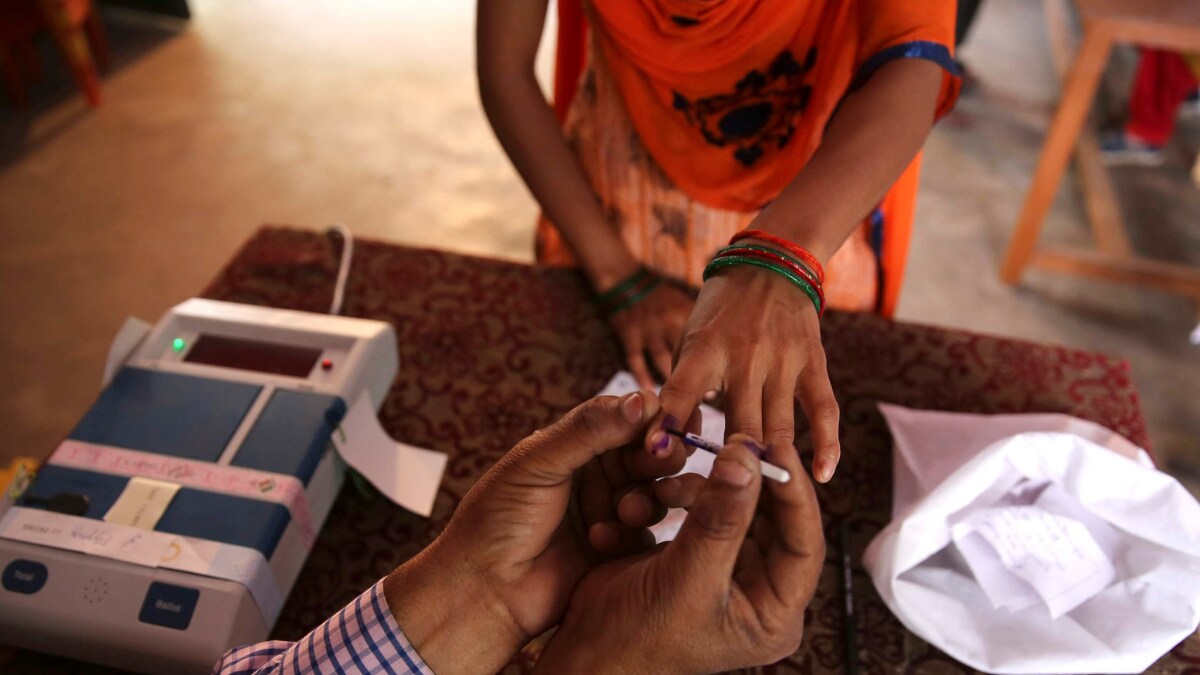Section 135 ‘B’ of the Representation of the People Act, 1951, stipulates that employees are entitled to paid leave on the day of voting. (PTI)
Unpaid leave, wage loss, travel expenses and payment delays are all factors that hinder most migrants from voting. As of now, there is no plan to allow domestic migrants to vote remotely but they have right to paid leave
The voter turnout in the 2019 General Elections was lower in states with larger immigration rates and populations, a report of the Election Commission has revealed.
The highest voter turnout as of now in India’s General Elections was in 2019 at 67.4 per cent, while almost 30 crore electors did not vote which included a major chunk of migrant workers.
According to the statistics report of the Election Commission of India (ECI), 61.46 crore voters cast votes out of 89.6 crore electors in the 2019 Lok Sabha Election. ECI stated in the press release, “The voter turnout in General Elections 2019 was 67.4% and the Election Commission of India is concerned about the issue of over 30 Crore electors not exercising their franchise and also differential voter turnout in various States/UTs.”
The commission added: “Inability to vote due to internal migration (domestic migrants) is one of the prominent reasons to be addressed to improve voter turnout and ensure participative elections.’
The number of internal migrants reached 45.36 crore, according to the 2011 census and the states with the highest net out-migration numbers among all in the country were Uttar Pradesh (31.56 lakh) and Bihar (7.06 lakh). The voter turnout in the 2019 General Election in Uttar Pradesh (59.21 per cent) and Bihar (57.33 per cent) was lowest among the states. Maharashtra, with the highest migration (79.01 lakh), had 61.02 per cent voter turnout in 2019.
Notably, the majority of areas that had low voter turnout in the last Lok Sabha elections are migratory labour hubs. While evaluating the state’s election preparations, Chief Election Commissioner (CEC) Rajiv Kumar noted that Uttar Pradesh has the nation’s largest voter base but one of the lowest voter participations.
Many could not vote because they were not present in their registered constituency. The majority of Indian migrants are transitory individuals for whom registering at their place of employment is not an appealing choice. At the same time, enrolment in a new constituency necessitates adequate verification of new residence, which is rarely possible due to the informality of migrant housing.
Unpaid leave, wage loss, travel expenses and payment delays are all factors that hinder most migrants from voting. As of now, there is no plan to allow domestic migrants to vote remotely but they have right to paid leave.
ECI stated the following key points to increase awareness that the voters are entitled to paid leave: “It is clarified that in such a situation, even those electors, including casual workers working outside the constituency concerned, would be entitled to the benefit of a paid holiday extended under the Section 135B(1) of the Representation of the People Act, 1951. The daily wage/casual workers are also entitled for a holiday and wages on poll day.”
“No deduction or abatement of the wages of any such person shall be made on account of holiday having been granted in accordance with sub-section (1) and if such person is employed on the basis that he would not ordinarily receive wages he would have drawn had not a holiday been granted to him on that day. ”
“If an employer contravenes the provisions of sub-section (1) or subsection (2), then such employer shall be punishable with fine, which may extend to five hundred rupees.”
“This section shall not apply to any elector whose absence may cause danger or substantial loss in respect of the employment in which he is engaged.”
It encompasses employees ordinarily residing in the constituency where the election occurs but are employed elsewhere, ensuring their ‘right to leave’ on the day of voting. For example, if a voter from Bihar, who is employed in another state, wishes to vote in his/her hometown, the employee is entitled to a holiday on the day of the elections in Delhi.
As per the Indian Constitution, voters are entitled to paid leave on the day of voting. Section 135 ‘B’ of the Representation of the People Act, 1951, stipulates that employees are entitled to paid leave on the day of voting.
Stay updated with live coverage of 2024 Lok Sabha Election, Tamil Nadu Election 2024, West Bengal Election 2024, Arunachal Pradesh & Sikkim Election Phase 1 Polling on our website. Get the latest updates, polling trends, and analysis in real-time.Stay Ahead With all the Lok Sabha Election 2024 Related Real-Time Updates At News18 Website.







